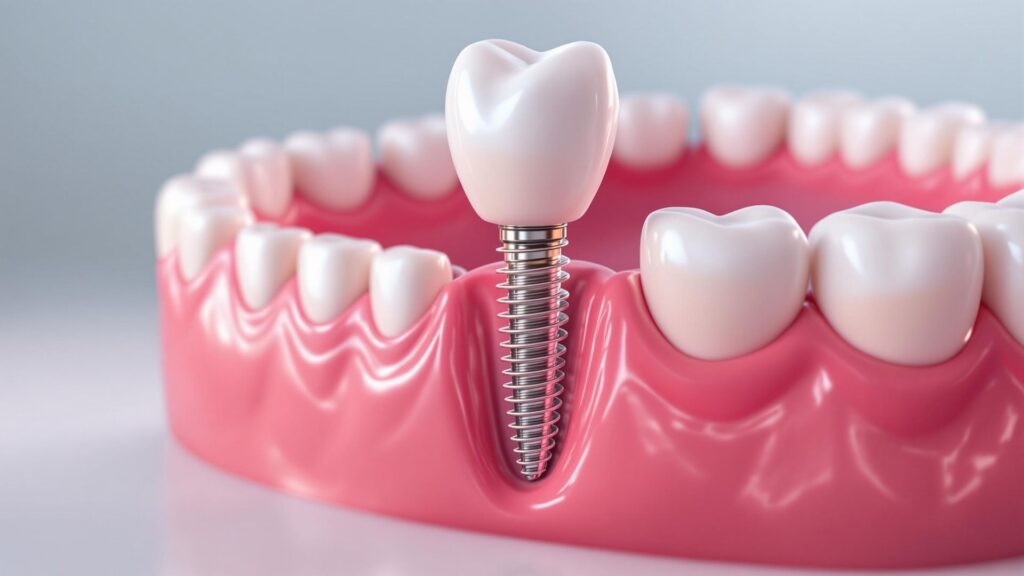Missing teeth can affect far more than just your smile — they can impact your confidence, your ability to chew comfortably, and even the health of your jawbone. This is where dental implants come in: a modern, reliable solution that offers both functional stability and natural esthetics.
What Are Dental Implants?
A dental implant is a small titanium or ceramic post surgically placed into the jawbone to replace the root of a missing tooth. Once healed, it serves as a stable foundation for a crown, bridge, or denture, restoring your smile’s appearance and strength.
Function: Beyond Looks
Dental implants are designed to work just like natural teeth. Because they fuse directly with the jawbone (a process called osseointegration), they provide:
- Strong biting and chewing power
- Stability that doesn’t slip or shift, unlike removable dentures
- Help to maintain healthy jawbone density by stimulating the bone, preventing the bone loss that typically follows tooth loss
This means you can comfortably enjoy your favorite foods without worrying about your teeth moving out of place.
Esthetics: A Natural Smile
Aesthetically, dental implants look incredibly natural. Each restoration (the crown or bridge that attaches to the implant) is custom-designed to match the shape, color, and size of your surrounding teeth. This attention to detail ensures:
- A seamless blend with your natural teeth
- Restoration of facial contours, as implants help prevent the “sunken” appearance that can develop when teeth and bone are missing
- Confidence to smile, speak, and laugh freely
Who Can Benefit from Dental Implants?
Dental implants are a versatile option that can help many patients, including those who:
- Have lost one or more teeth due to decay, injury, or gum disease
- Find dentures uncomfortable or unstable
- Want a fixed (non-removable) solution
- Seek to preserve jawbone and facial structure
- Want to avoid reducing healthy neighboring teeth for a bridge
Good candidates should have healthy gums and adequate bone to support the implant. In many cases, bone grafting can be performed if additional support is needed.
Why Are Dental Implants So Widely Used?
Dental implants have become the gold standard for tooth replacement because they:
- Offer unmatched stability and longevity (often lasting decades or a lifetime with proper care)
- Improve oral health by keeping adjacent teeth untouched
- Help prevent bone loss and maintain natural facial shape
- Provide superior comfort and confidence compared to removable options
Modern implant dentistry has also made the procedure highly predictable and minimally invasive, making it accessible to more patients than ever.
In Summary
Dental implants do more than just replace missing teeth — they restore function, preserve oral health, and create a smile that looks and feels natural. It’s this unique combination of durability, beauty, and health benefits that makes implants one of the most trusted and widely used solutions in modern dentistry.
Frequently Asked Questions About Dental Implants
Q: Are dental implants painful?
A: Most patients say the procedure feels easier than expected. Placement is usually done under local anesthesia, and discomfort afterward is typically mild and manageable with over-the-counter pain relievers. Your dental team will also guide you through aftercare for a smooth recovery.
Q: How long do dental implants last?
A: With good oral hygiene and regular dental checkups, implants can last many years — often decades, or even a lifetime. The crown or bridge on top may need replacement eventually due to normal wear.
Q: Can anyone get dental implants?
A: Many people are good candidates, but healthy gums and enough jawbone are important. If you have bone loss, procedures like bone grafting can often make implants possible. Your dentist will assess your overall health and oral condition to decide if implants are right for you.
Q: How do I care for dental implants?
A: Caring for implants is similar to caring for natural teeth: brush twice daily, floss daily, and visit your dentist regularly. Avoid smoking, as it can increase the risk of implant complications.
Q: Are implants better than dentures?
A: Implants provide more stability, better biting strength, and help protect jawbone health compared to traditional removable dentures. However, the best option depends on your specific needs, oral health, and preferences — your dentist can help you decide.
Q: How long does the implant process take?
A: The process can vary depending on your case. After implant placement, it often takes a few months for the implant to fuse with the bone before adding the final crown or bridge. Some same-day solutions exist, but your dentist will recommend what’s safest and most effective for you.


